
Happy Holidays.
Greetings and best wishes to all readers, and happy Christmas to everyone who is about to celebrate. As we draw near the end of the year many of us settle down for a rest from beekeeping. However, some of us don’t ever stop thinking about bees. The Staffordshire beekeepers usually organise a Zoom presentation between Christmas and New Year which is pretty dedicated in my opinion. This blog is for everyone with time to read it and perhaps to reflect on why you got into beekeeping yourself, what impact it has made on your life, and how to do better in the coming year. I’ve talked about getting started in beekeeping in recent blogs, and now I want to share my story which still suprises me.
My Story.
I live in the Scottish Highlands very close to Cawdor Castle in Nairnshire and I’m passionate about promoting all pollinators. I look after around 10 colonies of honey bees and I try to care for them with minimal interference. I always make sure that they go into winter with at least 35 lbs of their own honey stores and my overwintering strategies are usually always successful. Over 18 years my beekeeping role has evolved to become one of information- sharing through teaching practical skills and mentoring, giving presentations, and writing, and I want to share with you how all this came about for it was never in my original plan. I really just wanted a quiet retirement pottering around the garden and watching the bees.
The Trigger.
Imagine a hot sunny day in June and a cotoneaster hedge, its tiny pink flowers barely open, vibrating with honeybees almost completely covering the shrub. This is how it was for me in 2004; but the warmth, colour, scent, and the lulling hum were all real. It was then that I thought, “Hey, little bees, you could be living in my garden and working for me.” Little did I know that the roles would reverse and I would be working hard for bees, of all species, 18 years later.
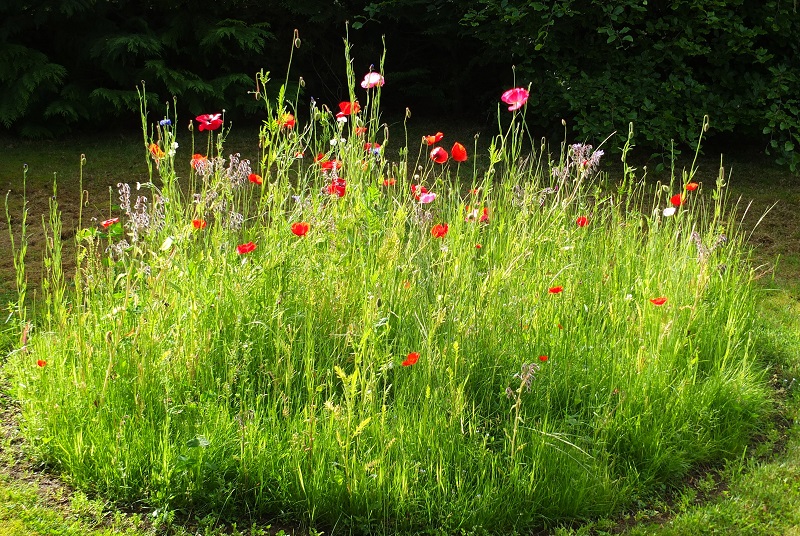
Back then I would have naively explained that the bees covering the cotoneaster fascinated me and that I wanted them to be working hard for me making honey. Later, I would discover my mistake and how I would be continually striving to improve conditions for honey bees and their other insect colleagues in the pollination business. Soon after starting my beekeeping odyssey, it dawned on me that pollinators and food security are seriously under threat and that I could do something about it immediately. And, so, I joined the worldwide movement of humankind making a difference through the promotion and conservation of fragile pollinator habitats, and helping beekeepers become more knowledgeable and skilled.
In those early days, I imagined just keeping a couple of hives and producing honey for family and friends whilst enjoying watching bees alongside all the other wildlife that adds real meaning to my life. I wanted also to satisfy my yearning to be closer to the land and have some useful occupation when my nursing career drew to an end in 2010.
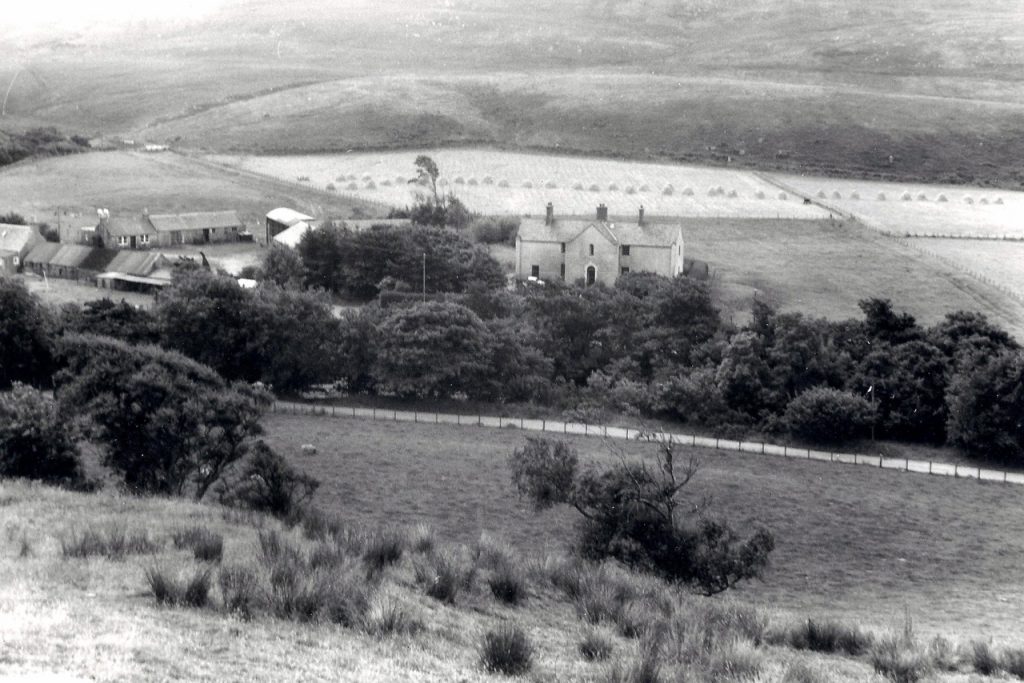
Having had no previous beekeeping experience, I realised that much research was needed before a commitment could be made. Growing up on a remote Argyllshire hill-farm in the Scottish Highlands gave me some insight into how the land is worked and how animals fit in and are managed responsibly according to the local geography, climate, and conditions. As soon as I was able my mother took me walking in the glen to discover nature in all its forms, and I grew up knowing all the wild flowers and trees growing in the area.
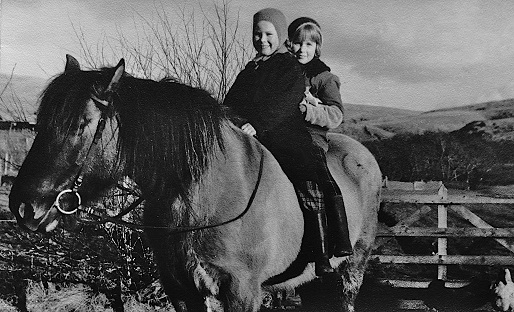
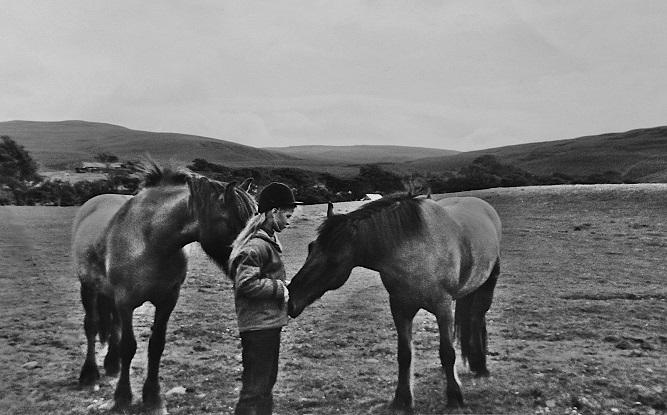
My father taught me the names of the birds and I loved the farm with a passion. I helped with farm work when school homework was done, and I rode my pony Captain everywhere feeling truly connected to the land.
Early Memory of Honey on the Comb.
One powerful lingering childhood memory is eating warm honey on the comb straight from Dan the shepherd’s bee hive. Then there was a gap of many years before I would taste fresh honey again. My sister Christobel kept bees when she settled down outside Glasgow to raise her family and work as a GP. She shared her sweet bounty and I was in awe of my big sister thinking her very brave, but I was never tempted to become involved until relatively recently.
Enjoying a challenge, I started on the preparations in 2004. I bought “Beekeeping for Dummies” and, despite it being an American publication where beekeeping conditions in the US differ from ours here in the UK, it was a good starting point. The plan was to spend the long dark Scottish winter evenings reading up and planning my apiary before acquiring bees in the spring.
Not According to Plan!
But, as Robert Burns wrote, “The best laid schemes o’ mice an’ men gang aft agley…” This certainly applied to me. When I casually asked a local farmer’s wife how I should go about getting bees (if I wanted to start beekeeping) her answer changed my life. Jackie told me that her husband used to keep bees but was now so allergic to their stings that he’d given up and wanted rid of them. Fergie had two colonies of bees that swarmed in from somewhere else and had taken up residence in his ornamental garden hives.
Becoming a Beekeeper.
Just one week later, on Sunday 7th November 2004 at 3 pm, I became a beekeeper. With the help of Linton, my ever-supportive and tolerant husband, the bees travelled a few miles home on our trailer, and, as luck would have it, the weather was cold enough for the bees to have formed their heat-conserving winter cluster and so were not inclined to come out and fly off. What I hadn’t learned yet was that the hives were double walled WBC’s, named after their designer William Broughton Carr. They are designed like boxes within boxes and you cannot usually move them easily because it is difficult to seal the bees inside unless the inside boxes fit well with no spaces. In this case, I wasn’t even aware of the hive construction details so the hives were just loaded up as they were.
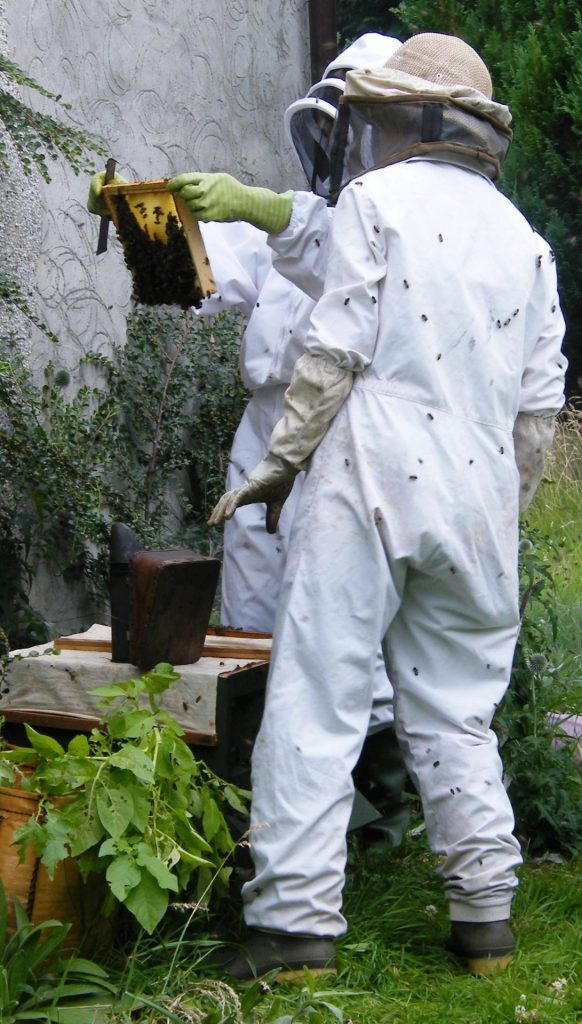
Christobel came up from central Scotland in March 2005 during a warm spell, and together we did my first hive inspection which went well. It was later when I opened the hives by myself that I felt quite nervous. The bees had built up in numbers from around 10,000 after winter to around 30-50, 000 bees in June. Masses of bees boiled up to the top of the frames and my heart thumped. I hadn’t quite mastered the art of using the smoker to keep them down below the top bars. I’m sure that the bees sensed my fear and I got stung a few times. When I started singing to calm myself down during hive inspections my movements gradually slowed down and I became more relaxed with the bees noticeably settling down too.
New Hives.
In order to return the ornamental hives to their owner, I researched and bought new British National hives and transferred the bees to their new homes. I heeded advice not to buy second hand hives that may contain the dreaded American foulbrood bacterial spores that can lurk in woodwork for more than fifty years unless they are thoroughly scorch- heated. I’m not a risk taker so I bought new ones which was a big expense, and navigating the beekeeping supplies catalogues was like finding my way in a foreign country.
It was a steep learning curve and I felt quite alone on my journey till one April day a man called James appeared in my garden as I was watching the bees. “I see you keep bees,” he said. “Yes, I do,” I tentatively replied stalling for time concerned that he might want to complain about having been stung by them, or that I shouldn’t keep bees in a village. “Well, I’ve come to invite you to join our local beekeeping association,” he said smiling. That was it; just what I needed. I can’t imagine why I hadn’t gone looking for one myself. Meetings were held in the local village hall less than a mile away.
A Quest for Knowledge.
What happened next was life-changing. In 2004, the local beekeeping association was very small and run by a few kindly old men who were tired of keeping it going themselves and I was recruited to the committee at my second meeting. Feeling panic stricken at my lack of knowledge I searched for it like a starving person. I followed the Scottish Beekeeper’s Association (SBA) self-study modular exam system to qualify as Scottish Expert Beemaster in a few years, though, according to Eva Crane, it takes 20 years at least to become an expert in beekeeping. I’m with Dr Crane on that!
The Scottish Agricultural College (now Scotland’s Rural College) attracted me onto one of their distance learning programmes and I qualified with a Higher National Certificate in Countryside Management and volunteered with the Forestry Commission as a Countryside Ranger in 2008. I thought that I might make a retirement career out of that but changed my mind and decided to champion honey bees and put my energy into something on my doorstep.
Service to Beekeeping.
Over the intervening years, I’ve taught beekeeping courses at local and national levels, and served the SBA as: trustee, representative, conference organiser, practical exam assessor, and exam paper marker. At local level, after a break, I continue to serve the local association members through the committee and mentoring beekeepers at all levels.
My Favourite Part of Beekeeping.
My happiest beekeeping memory is finding a letter in our mailbox written in pencil on pink girly paper that made my heart sing. The letter read:
” Dear Mrs Chilcott,
My name is Connie and I am six. Please can I come and see your bees? I have been learning about bees at school and am really interested. If that’s okay please can you ring my mummy or daddy on ……
Love from Connie”.
Connie and her daddy Giles came to see my bees two days later and she was thrilled to wear the little bee suit that I keep for such occasions. She held a frame of honey and we took a teaspoon for her to taste later as we sipped home-made elderflower cordial. We sat just a few feet away from the apiary listening to the gentle sounds of thousands of wing beats thrumming like tiny snippets of bee conversations.
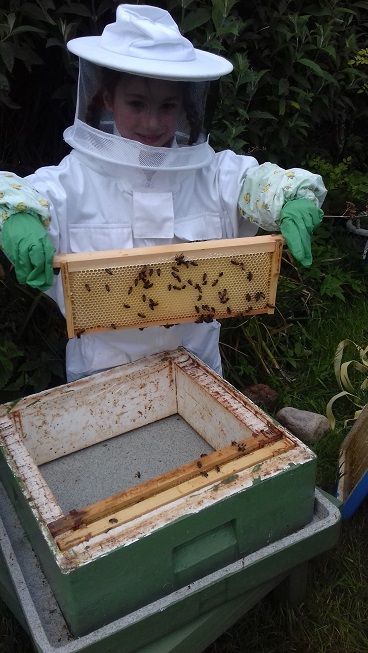
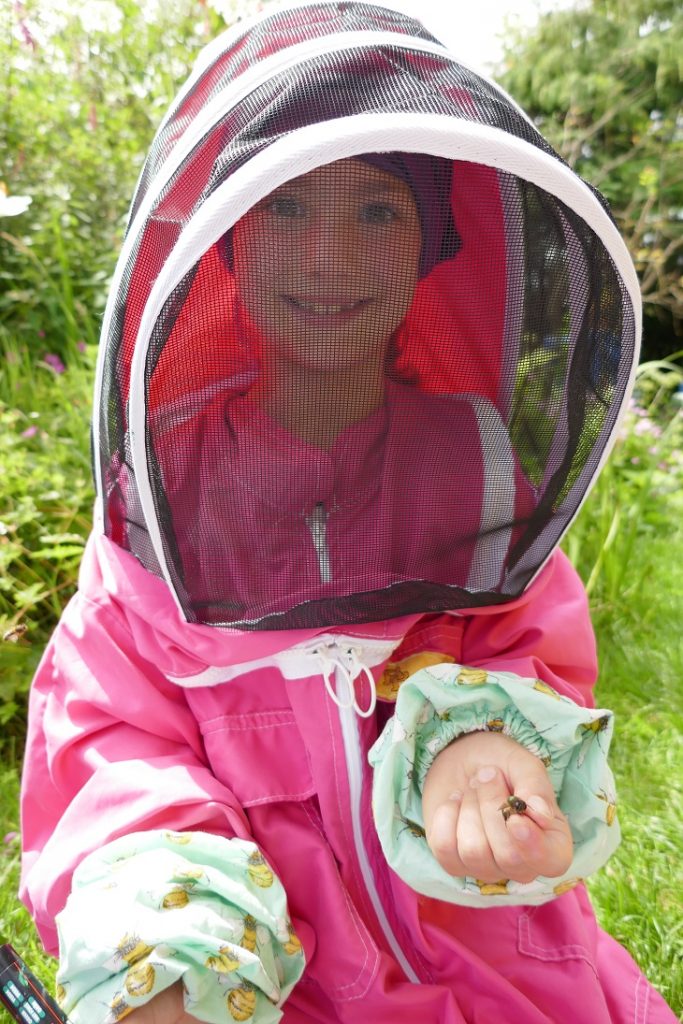
Connie came beekeeping with me for three years till the family moved to Wales, and we still enjoy a friendship through the post and telephone conversations. The experience has enriched my life and sharing bees with young people remains a large part of my beekeeping world. I have an observation hive and lots of children have visited this year. I wonder how many may go on to become beekeepers, farmers, environmentalists, economists, politicians, and policy makers?
Continuous Learning.
It would be disingenuous of me to lead you to believe that my reasons for keeping honey bees are purely based on altruism for this is not so. I’ve fallen in love with bees and beekeeping is an avocation that brings me more joy than I can ever fully explain. I look ahead to each new season with excited anticipation for they are all so different and I’m continually learning new things from the thousands of bees working in harmony as one, and holding close secrets yet undiscovered.
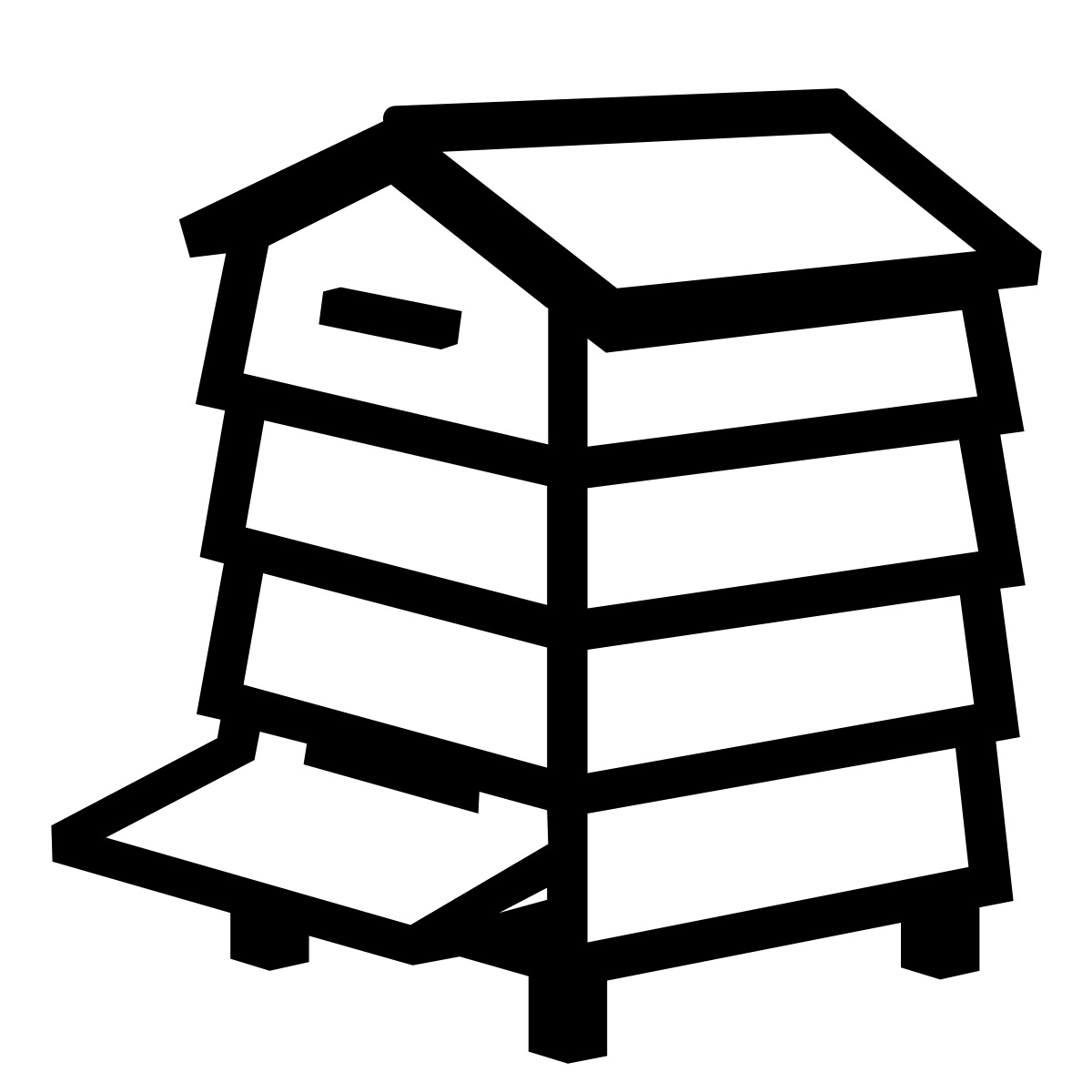
Ann!
I’m sitting here, preparing for the day with my coffee meditation and up pop your weekly musings to keep me company. And what a treat you have in store for us this week! A beautiful account of your journey – captivating! Thank you – not only for brighting my morning coffee time, but also for reminding me how lucky we beekeepers are. I wish you a happy Christmas and look forward to our adventures next year!
Liz
Greetings, Liz,
Thank you for your appreciative email. It’s good to know it’s all worthwhile.
Wishing you a happy healthy New Year, and inspiration for the study programme.
Ann.
Hello Ann. This is so interesting and heart-warming too. Thank you for this and all your writing. Archie
Hello Archie,
Thank you for your kind words and I am glad that you enjoy the blogs.
Best wishes for a happy healthy New Year and a good new bee season,
Ann.
It was nice to learn more about how you came to become a beekeeper – amazing. Have a Merry Christmas and a Happy New Year!
Hello Paul,
I’m glad you liked the account of my how not to do it start up in beekeeping.
All the best to you for a happy healthy New Year and a good season with the bees.
Ann.
As always, another enjoyable article from you, Ann. I look forward to more in 2023 and in the meantime have a very happy Christmas.
Hello Maurice,
Thank you for your encouraging comments and I hope to produce more material in 2023.
Wishing you all the best for a great new beekeeping season in 2023.
Ann
Merry Christmas Ann,
I enjoyed reading how you started in beekeeping and loved the photos of your childhood ponies. We’ll done!
My best to you,
Megan
Hello Megan,
Happy New Year to you and thank you for that lovely Christmas message. I’m glad you liked the photos of the ponies. It gave me a good grounding for managing tricky horses much later!!!
I wish you another good beekeeping season ahead for Hudson Bee Supply.
Ann.
Yuletide blessings to you Ann, I am a relatively new beekeeper, have kept bees for 4 years, I did my basic training during COVID by zoom and finally got to the practical part, after having kept bees for a while.
Your posts are uplifting and informative.
So thank you so much for your time and effort.
May 2023 bring you joy and good luck.
Hello, Debz, Thank you for your lovely Christmas message and for letting me know that you find the blogs useful. Well done continuing with your beekeeping training in challening times. Everything gets easier with each new season in terms of handling the bees, but I find that the more knowledge I get the more I realise I have still to learn. Never ending learning makes beekeeping pretty special.
That’s wonderful Ann you are so good at writing about the bees and how much they mean to you. Also about other pollinators and how we have to think of them too. I like the fact that you leave them with 35lbs honey for the winter stores. Is that what most people do?
Happy new year and see you soon
Hello Susan and thank you for being a loyal reader and commentor. I think that a lot of people do leave the bees their own honey but that could be an interesting question for a poll perhaps. Best wishes for a happy New Year from Ann.
Lovely article Ann, thank you.
Picking up on your reply to Debz, I wish more beekeepers would realise the benefits of learning a little more about beekeeping.
Happy New Year and thank for all your articles over the past 12 months.
Hello Richard. Thank you for your positive comments and for supporting the blog. How can we encourage new beekeepers to learn a little more about beekeeping do you think? I think that our BBKA and SBA modular exam systems need modernising for starters. Still in holiday mode so thoughts for the future. Happy New year, Ann.